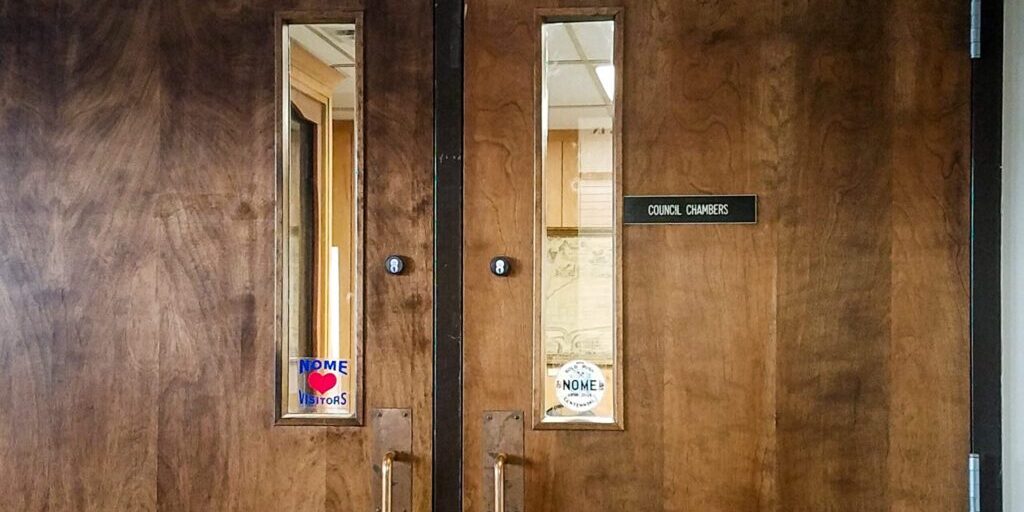The Nome Common Council passed a new emergency ordinance on Friday evening. It allows the City Manager and council to act quickly in passing mandates to slow the potential spread of the coronavirus. It does not automatically include any travel regulations.
As businesses in the city begin to re-open and restrictions on regional travel are loosened, the council heard recurring concerns during citizens comments on Friday night.
“Most people are in agreement that we should have a “Plan B” in place.”
– Councilmember Mark Johnson
And a “Plan B” is exactly what this new ordinance is designed to be. It’s more scaled back and limited than the original emergency ordinance passed back in March. Liquor and commercial marijuana stores’ hours are no longer limited to end each day at 7pm as per the first emergency ordinance.
But if the region or state begins to see an increase in COVID-19 cases, it would allow Nome’s City Manager, with the approval of the council, to pass public health mandates after giving 24-hour notice. It can also re-direct city staff to do COVID-19 related duties. This ordinance does somewhat vaguely state that city resources can be used as “reasonably necessary” to respond to the coronavirus emergency.
Although the new emergency ordinance does not automatically include any travel regulations or permit requirements, it does not rule out the council or City Manager’s ability to create them. The council will have to meet again to decide if they want to continue the travel permitting process in Nome.
City Manager Glenn Steckman shared that Norton Sound Health Corporation is planning to implement COVID-19 rapid testing at the Nome airport, potentially as early as this week.
“The city wants none of that [patient] information. That information is between the hospital and the person being tested and the hospital will do the follow-up calls. We are not doing any follow-up calls on quarantine anymore.”
Steckman stressed that Nome cannot currently mandate or require anyone to do a COVID test at the airport.
The State of Alaska still requires a 14- day quarantine for all out of state travelers. Intrastate travel is not authorized to or from communities off-the road system, except for essential services and “critical personal needs”, which the state says includes medical travel, grocery shopping, and subsistence activities.
During Friday night’s special session, comments were more orderly but more diverse in opinion than at the last council meeting. About half of the commenters called-in to support extending an emergency ordinance and intrastate travel restrictions, while the other half called-in in opposition.
Some like Ken Hughes of Nome proposed a different kind of emergency declaration. He suggested an economic disaster declaration, recommended slashing taxes, and easing business regulations.
“Imagine the increased business if there were no wharfage fees for fuel transfers and if we went to a 4% sales tax… or if pull tabs were taxed on ideal net and property tax went down a few mills? Bill the difference to COVID-19 response efforts and win again!”
Some Councilmembers were responsive to this idea, but such a declaration would require more research from them, and public notice of another
City Council meeting.
Other than for the benefit of public health and safety of Nome, the city says it has other practical reasons for passing this ordinance. Councilmember Mark Johnson explained that the city must have an emergency order in place to receive state and federal COVID-19 relief funds. The new amended emergency ordinance passed with all six councilmembers voting in favor.
Nome’s new and revised emergency ordinance is effective through July 14th. It can be amended or revoked by the council at any time. Next up for the City Council is a special meeting today, May 19th, to discuss travel requirements for visitors coming to Nome through Anchorage.
Image at top: The entrance to the Nome City Council chambers. Photo: Emily Hofstaedter, KNOM (2019).




